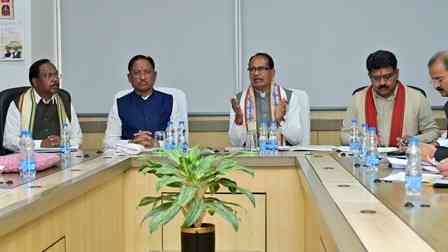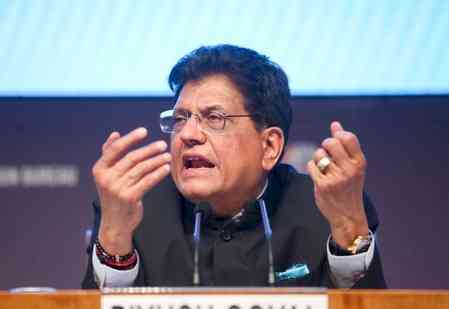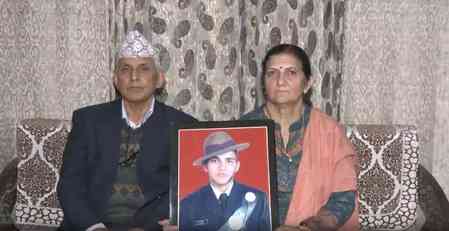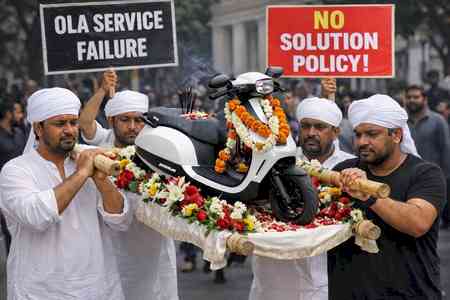Strengthening Digital Security, Building Trust, and Ensuring Resilience discussed experts at PHDCCI session on Cyber Hygiene for MSMEs
Running a business has always meant protecting what matters—shops, cash, and workers. But today, protection goes beyond physical spaces. Phones, laptops, apps, and cloud-based accounts are now integral to every workplace. Just as thieves can break locks, hackers can break into businesses. This was the central message at the Interactive Session on Cyber Hygiene for MSMEs organised by the PHD Chamber of Commerce and Industry (PHDCCI), where experts explained why digital safety is as important as physical safety.
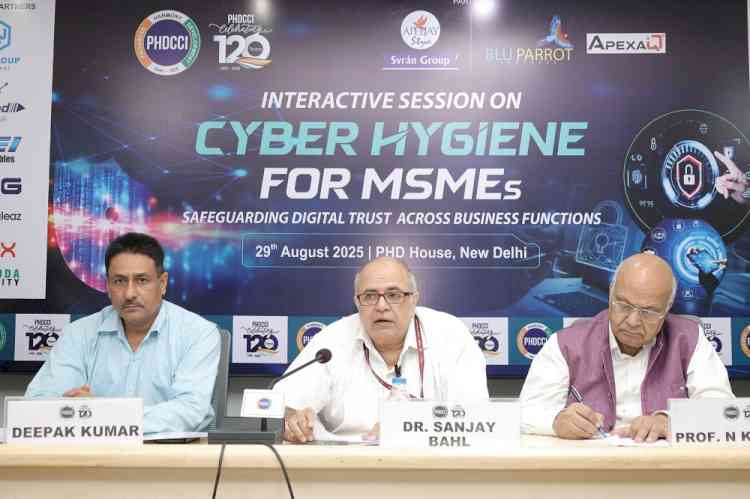
New Delhi, August 30, 2025: Running a business has always meant protecting what matters—shops, cash, and workers. But today, protection goes beyond physical spaces. Phones, laptops, apps, and cloud-based accounts are now integral to every workplace. Just as thieves can break locks, hackers can break into businesses. This was the central message at the Interactive Session on Cyber Hygiene for MSMEs organised by the PHD Chamber of Commerce and Industry (PHDCCI), where experts explained why digital safety is as important as physical safety.
The keynote speaker, Dr. Sanjay Bahl, Director General of CERT-In (Ministry of Electronics & IT), highlighted that MSMEs don’t just create products; they also handle sensitive data, including customer details, supplier bank accounts, and employee records. A single cyberattack can disrupt entire supply chains, freeze payments, and break trust.
He stated that CERT-In (Indian Computer Emergency Response Team) is the national nodal agency responsible for responding to cybersecurity incidents. Its role includes issuing advisories and alerts to businesses on new cyber threats and vulnerabilities, coordinating incident response when attacks occur to minimize damage and restore systems, and building capacity and awareness through training programs, workshops, and handbooks tailored for MSMEs.
Dr. Bahl underlined that for MSMEs, CERT-In’s mission is to equip businesses with both the knowledge and the tools to protect themselves in the digital era.
Dr. Jagannath Sahoo, CISO of Gujarat Fluorochemicals Ltd., reminded participants that phones today store more data than computers once did. If compromised, the damage can be severe. He also stressed that cybercrime is the fastest-growing “business” globally, making daily protective habits essential.
Prof. N. K. Goyal, Chairman Emeritus, TEMA, compared digital security to physical safety: just as we lock doors and install fire alarms, we must also lock our “digital homes.” His advice was to practice basic precautions instead of waiting for laws or enforcement.
Vinod Kumar Gupta, Scientist E at C-DOT, shared that Indian MSMEs are still being targeted by old malware, such as WannaCry. Weak practices such as skipping updates or not maintaining backups make them vulnerable. C-DOT is working on affordable, homegrown security tools to help small businesses protect themselves, he said.
Deepak Kumar, DC, I4C (Ministry of Home Affairs), spoke about India’s cybercrime portal and helpline 1930, which have already saved ₹6,000 crore and protected 18 lakh citizens. However, with 7,000 new cybercrime cases reported daily, collective action among governments, banks, and businesses is vital.
Dr. Neha Berlia, Chair, Task Force on Digital Security, PHDCCI, emphasized that cyber hygiene must become routine. Simple steps such as using strong passwords, updating software, and backing up data protect businesses. She added that global buyers now ask not only what you make, but also how securely you make it, making cybersecurity a key to global trade.
Nitin Kalra, Founder & CEO of Bluparrot Ventures Pvt. Ltd., moderated an engaging Panel Discussion on Cybersecurity Trends, patterns, and solutions. The discussion brought together diverse perspectives from leading experts, including: Prof. (Dr.) Charru Malhotra, Professor, ICT & e-Governance, Digital Transformation, Indian Institute of Public Administration; Lokesh Aggarwal, President & CEO, ApexaiQ; Prof. (Dr.) Smruti Ranjan Sarangi, Professor, Computer Science and Electrical Engineering, IIT Delhi and Vijayant Gaur, Director General, CSAI (Cyber Security Association of India).
The panel examined how cyberattacks are evolving, the patterns businesses should watch for, and practical solutions that MSMEs can adopt.
The technical session was followed by a Masterclass on Cybersecurity by Lokesh Aggarwal, who offered step-by-step insights on building stronger cyber resilience through low-cost, effective practices.
Dr. Jatinder Singh, Deputy Secretary General, PHDCCI, in the concluding remarks said that the focus should be on simplicity and practicality rather than technical jargon, and MSMEs should adopt quick wins such as enabling multi-factor authentication, keeping regular backups, and verifying invoices before payments.
More than 70 participants from Industry participated in the interactive session.


 City Air News
City Air News 

